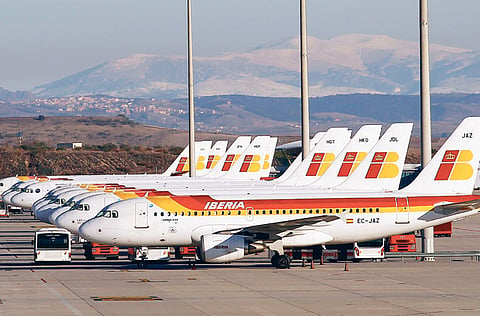Spain declares emergency as wildcat strike disrupts air traffic
Several airlines cancel flights as airports are paralysed

Madrid: Spain declared a state of emergency yesterday as a wildcat strike by air traffic controllers paralysed airports for a second day.
Planes sat on the tarmac and passengers camped out in airports across the country as the unofficial industrial action threatened to deepen Spain's economic problems. The disruption is set to continue. Deputy Prime Minister Alfredo Perez Rubalcaba said Spanish airspace would not re-open until today if the situation did not return to normal.
Many airlines, including Spanish flag ship carrier Iberia and Ryanair, have already cancelled flights and are making alternative arrangements for stranded passengers.
"We said that if the situation in the airports did not normalise, we would call a state of emergency. It's clear that the situation has not normalised," Rubalcaba said after an emergency cabinet meeting.
If the controllers — who are locked in a long-running dispute over pay and conditions with the state-run airport authority AENA — did not return to work they would be breaking the law, Rubalcaba added.
Popular revolt
The army took over air control towers following the walkout on Friday afternoon by controllers, which quickly stopped flights in and out of Spain's main airports, disrupting travel for around 250,000 people on one of Spain's busiest holiday weekends.
"We arrived at the airport at seven in the morning and it was surrounded by military trucks full of soldiers and riot police. They offered to put us on the waiting list but warned us we wouldn't be flying until Monday at the earliest," Esther Rojas said in Madrid's Barajas airport.
The unofficial stoppage followed cabinet approval of changes to rules on the number of hours air traffic controllers can work per year and of a law allowing the army to take over air space in times of emergency. The government has also approved plans to sell off 49 per cent of AENA, a move unions have condemned. Spain is carrying out tough reforms and spending cuts to rein in its deficit, kickstart its sluggish economy and ward off market fears it may need a bailout similar to that of Ireland.
The controllers gave no warning before starting their walkout by claiming sick leave and leaving their posts, effectively closing the whole of Spanish airspace except the southern region of Andalucia.
The air traffic controllers' union, USCA, said its workers were not on strike but had had enough. "This is a popular revolt," USCA head Camilo Cela told Reuters. Some international flights landed at Madrid's Barajas airport overnight, local media reported.
AENA said on its website that Spanish airspace would remain closed until 1200 GMT yesterday. The airport authority recommended travellers avoid its airports and contact their operators for information.
Public Works Minister Jose Blanco condemned the wildcat strike as "blackmail", and there was widespread condemnation of the controllers' action in Spanish newspapers.
Tourism accounts for around 11 per cent of Spain's gross domestic product and the Spanish Hotel Confederation said the disruption would lead to millions of euros in losses and damage Spain's image as a holiday destination.
Air traffic controllers' relatively high salaries and short working hours have raised hackles in the Spanish media at a time when the country is enforcing painful public sector pay cuts as part of its austerity measures.
Sign up for the Daily Briefing
Get the latest news and updates straight to your inbox



